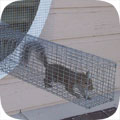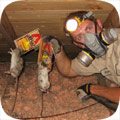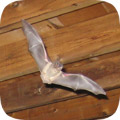- apachejunction@wildlifeanimalcontrol.com
Call 24/7 for a free quote:
480-676-3285
Apache Junction Wildlife Animal Control
Professional Wildlife Removal Company Servicing Apache Junction, AZ
If you have a problem with wildlife in your Apache Junction home, your best option is to hire a company that specializes in Arizona wildlife removal only. This is a specialty business, and regular pest control companies do not use the proper techniques to solve animal problems. I have spent many years reviewing Arizona and Apache Junction, and I recommend the following:
PHOENIX WILDLIFE REMOVAL
Cell Phone: 480-676-3285
NOTE: If you have a dog or cat problem, call Maricopa County Animal Services: (480) 983-4405

PHOENIX WILDLIFE REMOVAL specializes primarily in removing animals from attics of homes and buildings - this includes squirrels in attics, raccoons, and rats or mice in homes. Arizona also has a documented problem with
bats in buildings, and PHOENIX WILDLIFE REMOVAL is specially trained in bat removal. They also perform general wildlife trapping services, such as the capture and removal of skunks or opossums on the
property. Call 480-676-3285 to discuss your critter problem and schedule a same-day or next-day appointment. Click here to learn more about what prices we charge in 2023.
When hiring a company to solve your wild animal problem, you want these features:
- Specializes in wildlife removal, not pest control
- Fully Arizona and Maricopa County licensed and insured
- Works 7 days per week (critters don't take weekends off)
- Performs full building inspections: enters and inspects attic
- Performs exclusion repairs, with guarantee against animal re-entry
- Offers cleanup of biohazardous wildlife waste
PHOENIX WILDLIFE REMOVAL is a full-service Apache Junction wildlife removal company. This is very different from a regular Apache Junction pest control company. The pest control companies spray poison to kill insects. This is not at all
similar to wildlife removal. PHOENIX WILDLIFE REMOVAL performs a full inspection of the home or property, and determines why the animal(s) are there, and if inside a building, how the animals got inside. All
animals (including rodents) are trapped and removed, or if possible, removed from the building using special exclusion devices. Once the animals are gone, preventative repairs are essential, and
cleanup is sometimes recommended.
 Apache Junction wildlife trapping - it's not as simple as it may seem. It's illegal in Arizona to trap without a license. Trap type is very important and there are many different types, bait is somewhat relevant, trap placement
is vital, and there are dozens of small things that are very important to know.
Safety is a concern. Then once the animal is trapped, it must be removed and dealt with in the proper manner according to Arizona law. We offer Apache Junction raccoon removal. Read more about how to get rid of raccoons.
Apache Junction wildlife trapping - it's not as simple as it may seem. It's illegal in Arizona to trap without a license. Trap type is very important and there are many different types, bait is somewhat relevant, trap placement
is vital, and there are dozens of small things that are very important to know.
Safety is a concern. Then once the animal is trapped, it must be removed and dealt with in the proper manner according to Arizona law. We offer Apache Junction raccoon removal. Read more about how to get rid of raccoons.
 Animals in attics - this is our specialty at PHOENIX WILDLIFE REMOVAL. Many types of animals like to live in attics. This includes squirrels, raccoons, rats, mice, bats, birds, and even possums. Critters like to go into attics for a safe place to live
and raise their young. Removing animals from attics is very complex work, partly because of the presence of baby animals. If you need Apache Junction squirrel removal, we can remove all the squirrels from your attic, and seal out any future ones. Read more about how to get rid of squirrels.
Animals in attics - this is our specialty at PHOENIX WILDLIFE REMOVAL. Many types of animals like to live in attics. This includes squirrels, raccoons, rats, mice, bats, birds, and even possums. Critters like to go into attics for a safe place to live
and raise their young. Removing animals from attics is very complex work, partly because of the presence of baby animals. If you need Apache Junction squirrel removal, we can remove all the squirrels from your attic, and seal out any future ones. Read more about how to get rid of squirrels.
 Rodent control must be done in a very specific way. First off, the most important thing is that all the openings that rats and mice can use to enter a house be sealed. Then all the rodents must be physically trapped and removed.
Never, ever use poison! Most Apache Junction exterminators will just use this lazy poison technique to kill rodents, and it causes more harm than good - dead stinky rats, and it doesn't solve the problem. Call us for correct Apache Junction rat removal. Read more about how to get rid of rats.
Rodent control must be done in a very specific way. First off, the most important thing is that all the openings that rats and mice can use to enter a house be sealed. Then all the rodents must be physically trapped and removed.
Never, ever use poison! Most Apache Junction exterminators will just use this lazy poison technique to kill rodents, and it causes more harm than good - dead stinky rats, and it doesn't solve the problem. Call us for correct Apache Junction rat removal. Read more about how to get rid of rats.
 Bat removal is a highly specialized task. Arizona is known to have colonizing bats who often live in buildings. Bats love attics. If not removed, the colony can grow to a very large size over the years. The bat droppings are often corrosive and
cause health risks. The same goes for bird droppings on or in buildings. We perform Apache Junction pigeon removal and bird control. But our specialty is Apache Junction bat removal. We remove 100% of the bat colony and seal the building so that it's totally bat-proof. Read more about how to get rid of bats.
Bat removal is a highly specialized task. Arizona is known to have colonizing bats who often live in buildings. Bats love attics. If not removed, the colony can grow to a very large size over the years. The bat droppings are often corrosive and
cause health risks. The same goes for bird droppings on or in buildings. We perform Apache Junction pigeon removal and bird control. But our specialty is Apache Junction bat removal. We remove 100% of the bat colony and seal the building so that it's totally bat-proof. Read more about how to get rid of bats.
 If you have animals inside a house, no job is complete without proper exclusion repairs. If you simply hire a Apache Junction trapper who only removes the critters, then the problem will return. You need to hire a Apache Junction wildlife control company that identifies 100% of the animal entry points
into your building, and seals them shut with professional repairs. In addition, in many cases animals have left waste or contamination behind, and you'll want a company that can provide professional cleaning services. PHOENIX WILDLIFE REMOVAL does both.
If you have animals inside a house, no job is complete without proper exclusion repairs. If you simply hire a Apache Junction trapper who only removes the critters, then the problem will return. You need to hire a Apache Junction wildlife control company that identifies 100% of the animal entry points
into your building, and seals them shut with professional repairs. In addition, in many cases animals have left waste or contamination behind, and you'll want a company that can provide professional cleaning services. PHOENIX WILDLIFE REMOVAL does both.
The above are just some of the services offered by PHOENIX WILDLIFE REMOVAL. We also trap and remove animals that destroy lawns, such as moles, or digging animals. Sometimes animals like opossums will live under buildings, steal pet food, raid garbage cans, etc.
Read about how to get rid of opossums. Skunks commonly live under sheds or decks, and set up a den. We can trap and remove them without them spraying. Read about how to get rid of skunks. PHOENIX WILDLIFE REMOVAL
also provides dead animal removal in Apache Junction. If you need help with any other wildlife conflict, from a fox, beaver, groundhog, or any other critter, we can solve it. We also do Apache Junction snake removal - most of the snakes in Arizona are not venomous, but
call us if you want safe removal, or read about how to get rid of snakes in Apache Junction. And remember, we are a private business, not Maricopa County Animal Control Services, so if you have a dog or cat problem, call the County at (480) 983-4405.
Maricopa County animal services does not handle any wildlife issues.
PHOENIX WILDLIFE REMOVAL: 480-676-3285
Apache Junction Pricing Info For Year 2023
 Every wildlife removal situation is different, from the species of animals involved, the location of the animal inside a house or outside, the extent of repairs or cleanup, etc. It's impossible to give one-size-fits-all prices. Examples MIGHT include:
Every wildlife removal situation is different, from the species of animals involved, the location of the animal inside a house or outside, the extent of repairs or cleanup, etc. It's impossible to give one-size-fits-all prices. Examples MIGHT include:
Small Job: For example, a one-stop job to remove an animal in the yard: $100 on up
Medium Job: For example, getting critters out of your house with minor repairs: $300 on up
Large Job: For example, a project involving many service trips and complex work: $500 on up
Give us a phone call now and tell us about your wildlife issue and we will be able to give you a price estimate over the phone. If you're cool with it, we can schedule a same-day or next-day appointment if you like. Our prices are fair, and a good value because we do the job right, the first time.
Apache Junction Wildlife Tip #1:
DO RACCOONS HIBERNATE?
During the winter, it is not uncommon for small animals and rodents to hibernate. Most of them fatten up during the summer and gather food during the fall, then settle down in their cozy nests for the long winter months. This also means that they don't breed, because they are sleeping.
Raccoons are small mammals that live in forests and woods and very often, near human settlements. Although most small animals hibernate during the winter, raccoons do not, not really. Raccoons stay active during winter using a mixture of instinct and careful planning. Yes, planning.
During the summer and fall, raccoons gather food and fatten up just like all the other hibernators and seemingly prepares for a long and restful slumber. They prepare their dens and when the temperature drops to below 25 degrees F. They nestle down for short periods of sleep lasting a few weeks. During those weeks of sleep, they consume the body fat they have managed to accumulate on their bodies and during the short waking periods, will feed on the food they managed to gather.
When their food stashes start to dwindle, they venture out during the short warmer periods to look for food and water. After this they go back to their little dens to keep sleeping until the time for their next foraging trip. During the long winter months, it is more common to see raccoons trying to enter human houses and may be found nesting in garages, basements, attics or even foraging into pantries.
When the spring comes, the raccoon will have lost all the fat it had accumulated around its abdomen to keep it going during the winter and will be very thin. It will then come out of its den and start to hunt to gain back its normal body weight.
Because raccoons don't truly hibernate, they can reproduce during the winter months and they do breed during January and February. Its cubs are born in the spring and stay with their mothers during their first winter.
During the winter, mothers will nest with their small babies and feed them. They use the small trips to the outside to teach them to forage for food. This means that when spring comes, the raccoon cubs will be around one year old and will be able to fend for themselves. They will go out on their own and look for mates to start their own families and continue the natural circle.
Most raccoons will not go far, staying within a few miles of their original families. It isn't uncommon though for some of them to travel hundreds of miles in search of a mate, good food sources and safe places to nest.
Apache Junction Wildlife Tip #2:
Arizona Wildlife Information:
Arizona State bird: Cactus wren
State mammal: Ringtail cat
State reptile: Arizona ridge-nosed rattlesnake
State amphibian: Arizona tree frog
State fish: Arizona trout
State insect: Two-tailed swallowtail
Arizona is most known for its beautiful desert regions filled with canyons and rock formations accented by cacti of varying height. What many people don't realize is that Arizona has its fair share of forests-over 20 percent of the state is woodland. These thick forests of pine and spruce trees are mostly in what is known as the Colorado Plateau. The drier regions are home to just as much wildlife, and there is no region in Arizona where animals are completely missing from the environment. For the most part, the summers in the state are hot and the winters are mild, but some of the regions with mountains and canyons can experience colder weather and even snow. There are ski resorts in northern Arizona.
State landmarks like the Grand Canyon make fantastic havens for wildlife. The water in the canyon gives life to all kinds of species including bald eagles, mountain lions, wolves, coyotes, rattlesnakes, and golden eagles. It also shelters a number of endangered species. The desert tortoise, big horned sheep, California brown pelican, spotted bat, and Southwest river otter are all on the protected list in this state.
Because of the diverse terrain, Arizona has all four of the major predators in the United States: black bears, coyotes, wolves, and mountain lions. Bobcats are also common, but they are known as "wildcats" by the residents of the state.
While Arizona still has raccoons, it also has a very raccoon-like creature called the ringtail cat. This animal is not part of the cat family, and it looks more like a cross between a raccoon and a fox. These solitary creatures live in cliff caves within the arid and semi-arid regions of the state. They have a diet of scorpions, insects, eggs, and small mammals.
Grazing creatures are also common, especially within the canyons where vegetation thrives. Arizona has mule deer, white-tailed deer, elk, and big horn sheep.
Pest animals are numerous in this state, just as in any other. The forested regions provide a good home for squirrels, bats, porcupines, skunks, raccoons, and mice. Another potential pest animal in Arizona is the javelina, a small wild pig. As with any location, homeowners have to worry about rats, which can survive in most regions of the world.
You can always call PHOENIX WILDLIFE REMOVAL, any time of day, at 480-676-3285, for a price quote for Apache Junction wildlife control services. I am confident that this is the best choice amongst wildlife removal companies in Apache Junction, AZ.





































